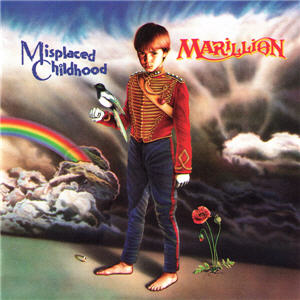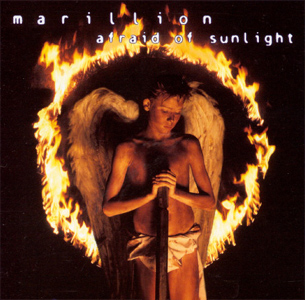Best Marillion album for a newbie? I am enjoying Glass Hammer per your blog.Happy as I am to try and answer that question, it's really a tricky one. Marillion has been around so long and shifted sounds so much that it's hard to tell a newb where to start. To understand why, you have to know a little about the band.
The obvious dividing line in the band's history is when original front man Fish left after four studio albums. It's not really that simple, however, as Steve Hogarth (aka "H"), the "new" guy has not been around for 22 years and a dozen studio albums is own damn self. More to the point, he's the face of the band now, so if you're interested in getting in on the train moving forward, he's your guy.
The Fish Years
But let's start with the beginning, which means the Fish years. Marillion, along with IQ, Twelfth Night, and Pallas, were part of an early 80s resurgence of progressive rock dubbed neo-prog. Heavily influenced by Genesis, Pink Floyd, and Camel, they took the 70s prog formula and streamlined it a bit, updating it for a new decade.
One of things that set Marillion apart from that pack was that Fish owed more to Peter Hammill than Peter Gabriel as a lyricist (or vocalist. Songs about drug addiction ("He Knows You Know"), vengeful ex-lovers ("Incubus"), and the resurgence of anti-semitism in Europe ("White Russian") aren't quite the airy fairy nonsense that populated most early prog albums.
That being said, if you're a fan of early Genesis albums, early Marillion will resonate with you. From Script for a Jester's Tear each album gets further away from that sound (or stereotype, if you will), until the band was the very definition of neo-prog. My entry into Marillion was Misplaced Childhood, their most successful album, commercially. It hit the top of the UK charts and spawned a set of hit singles. Nonetheless, it's two original sides basically ran together and it was played all the way through live, so it's epic beyond the singles. Any album born of a 10-hour acid trip is bound to be. Although I prefer Clutching at Straws more often than not these days, Misplaced is the place to start for the Fish years.
The H Years: Major Label Era
Musically, the H years pick up where the band left off with Clutching, moving further and further away from the Genesis influenced neo-prog blueprint. Some folks never got over that and parted ways with the band. Others stuck it out and have been rewarded with a band that is constantly taking on new influences and new ideas. As a result, they're producing music that is still modern and interesting.
When H came along, Marillion was still riding a pretty high profile in Europe, with major label support at a time when their contemporaries were struggling. But diminishing commercial returns meant those days were numbers. Perhaps appropriately, H got four studio-backed albums with the band, just like Fish did. One of them, Holidays in Eden, was a conscious attempt to be more commercially successful and suffers for it, although it still had some great music.
That being said, perhaps the failure of Holidays in Eden to please most anybody led the band to one of it's perceived heights in of the H years, Brave. A return to the concept album format, it was spawned by news reports about a teenaged girl found unwilling (or unable) to speak while wandering the Severn Bridge between England and Wales. The album explores various themes about how she might have gotten there and how the world reacts to such things. It's utterly brilliant and marks the beginning of the band's experimentation with looser more ambient material.
They followed that up with Afraid of Sunlight, the first album I got when it was new. Although it didn't completely grab me at first, it's grown into not only one of my favorite Marillion albums, but one of my favorites of all time. On the surface, it seems little lighter and more radio friendly than Brave. But dig past a couple of tracks and the expansive soundscapes that band hinted at on Brave explode on songs like the title track, "Beyond You," and "King." Afraid of Sunlight also contains "Out of This World," about the death of water speed record seeker Donald Campbell and inspired the salvage of his doomed "boat" Bluebird.
You'd be hard pressed to go wrong with either of those albums as a starter. Pick Brave if the concept album idea appeals to you, Afraid of Sunlight if stand alone tracks strike your fancy.
or
The H Years: Transitional Era
Brilliant as Brave and Afraid of Sunlight were, they were not particularly successful on the charts. As a result, the band's tenure on a major label came to an end. Over the next few years they found their footing going forward, both musically and financially.
Although the three albums in this period - This Strange Engine, Radiation, and Marillion.com - all have their moments, they're all kind of patchy when it comes to quality. Honestly, I wouldn't recommend anybody start with any of these to begin with. They're most interesting to listen to now knowing what came next.
The H Years: The Modern Era
When the band emerged from the wilderness, they had discovered how to tap into their loyal, if not huge, fanbase to support them in making the kind of music they were interested making, from tour funds to album preorders to finance recording. The music they wanted to make, turns out, doesn't bear a whole lot of resemblance to what they were doing a decade or so before.
The first real musical statement they made was Anoraknophobia, which further explored some of the ambient influenced soundscapes and trip hop. It was also packaged and marketed in a way that screamed "we're not that band that sounds like Genesis anymore!" They're right (and it's a good thing), but the eagerness to escape the "prog" label on that album always struck me as kind of a slap at those of us who had supported the band for a long time.
The real masterpiece of the band's current era, however, is Marbles. It takes what was going on before, adds a healthy dose of Floydian scope and some melodic overlays for all the lush stuff in the background to make the definitive statement of modern Marillion. Epic and intimate, lush and sparse, floating and rocking. If you don't find anything on Marbles that flips your switch, then modern Marillion just isn't for you.
Marbles was originally released in two versions, the 2-CD deluxe version for those (like me) who ordered it way ahead of time, and a 1-disc version released to retail shops. Since then, the 2-CD version (minus the lengthy book artwork from the original release) has become available on the band's website. I'd recommend going with that one, as the 1-disc version omits the epic "Ocean Cloud," which is worth the extra price of admission.
The couple of albums since Marbles have been a little hit and miss, although Happiness is the Road (another 2-CD set) has a lot to recommend it. For beginners, though, I'd hold off on those until later. For the record, I don't consider Less Is More, the recent album of acoustic versions of some songs as an "album" proper, since there was nothing new on it.
So, Start With . . .
So, the short answer after that lengthy explanation as to where to start with Marillion is, "it depends."* If you're interested in the band's early days, at their most obviously proggy, go with Misplaced Childhood. For a feeling of the early high points of the Hogarth era, it's Brave or Afraid of Sunlight. For what they're up to now, head for the 2-CD version of Marbles.
Or . . .
If you're the kind of person who goes for DVD things, there's another option. For the past decade or so, the band has put on festival-style weekends in Europe and Montreal, with three full nights of music (one usually built around a particular album). There are DVD releases from many of these events, but the two from the last run, Live in Montreal or Out of Season would be good starters. Each is 3 DVDs, one with the entire Seasons End album (plus some extras), one with a chronological walk through their discography, and another focusing on the epic tracks. Here's a teaser for Out of Season:
Again, if there's nothing in those discs that flips your switch, you're just not cut out to be a Marillion fan.
* I learned in law school that's the right answer to damn near every question.




No comments:
Post a Comment